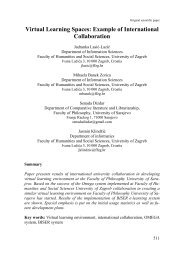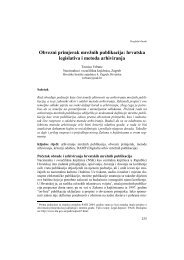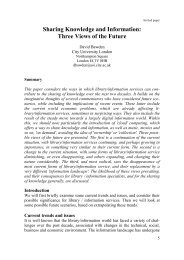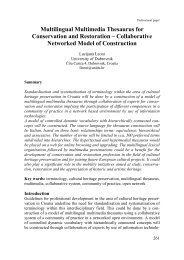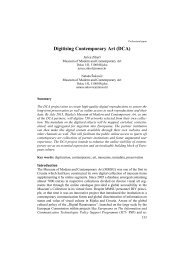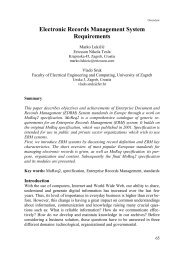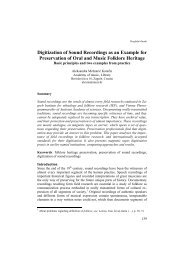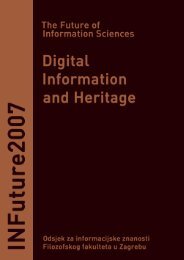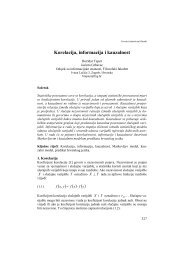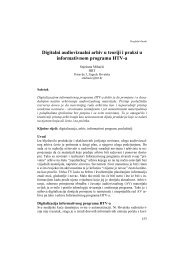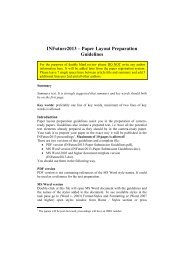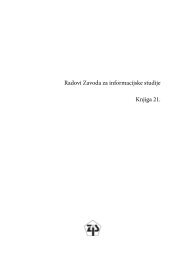Thesauri Usage in Information Retrieval Systems: Example of LISTA ...
Thesauri Usage in Information Retrieval Systems: Example of LISTA ...
Thesauri Usage in Information Retrieval Systems: Example of LISTA ...
You also want an ePaper? Increase the reach of your titles
YUMPU automatically turns print PDFs into web optimized ePapers that Google loves.
INFuture2009: “Digital Resources and Knowledge Shar<strong>in</strong>g”<br />
Scope Note (SN)= brief statement <strong>of</strong> the <strong>in</strong>tended usage <strong>of</strong> a descriptor. It may<br />
be used to clarify an ambiguous term or to restrict the usage <strong>of</strong> a term. 24<br />
<strong>Example</strong>:<br />
INFORMATION RETRIEVAL<br />
SN Techniques used to recover specific <strong>in</strong>formation from large quantities<br />
<strong>of</strong> stored data. 25<br />
Use For (UF) and USE (USE)= terms we consider to be equivalent (equal or<br />
almost equal by the mean<strong>in</strong>g) we can comb<strong>in</strong>e to the category <strong>of</strong> equivalence so<br />
that equivalent expressions match only one term. Equivalence relations direct<br />
synonyms and pseudosynonyms <strong>of</strong> specific term to appropriate descriptor. For<br />
these relations we use UF and USE references. 26<br />
The UF reference is employed generally to solve problems <strong>of</strong> synonymy occurr<strong>in</strong>g<br />
<strong>in</strong> natural language. Terms follow<strong>in</strong>g the UF notation are not used <strong>in</strong> <strong>in</strong>dex<strong>in</strong>g.<br />
They most <strong>of</strong>ten represent either (1) synonymous or variant forms <strong>of</strong> the<br />
ma<strong>in</strong> term, or (2) specific terms that, for purposes <strong>of</strong> storage and retrieval, are<br />
<strong>in</strong>dexed under a more general term. Years listed <strong>in</strong> parentheses <strong>in</strong>dicate the time<br />
period dur<strong>in</strong>g which the term was used <strong>in</strong> <strong>in</strong>dex<strong>in</strong>g. It provides useful <strong>in</strong>formation<br />
for search<strong>in</strong>g older pr<strong>in</strong>ted <strong>in</strong>dexes, or computer files that have not been<br />
updated. 27<br />
<strong>Example</strong>:<br />
BIBLIOGRAPHIC DATABASES<br />
UF Bibliographic Records (2004); Bibliographic Utilities (2004) 28<br />
The USE reference, the mandatory reciprocal <strong>of</strong> the UF, refers an <strong>in</strong>dexer or<br />
searcher from a no usable (non <strong>in</strong>dexable) term to the preferred <strong>in</strong>dexable term<br />
or terms. 29<br />
24<br />
Craven, Tim. Thesaurus construction. 2008. http://publish.uwo.ca/~craven/677/thesaur/ma<strong>in</strong>00<br />
.htm. (2009-07-22)<br />
25 ERIC: Education Resources <strong>Information</strong> Center: Search the Thesaurus. http://www.eric.ed.gov/<br />
ERICWebPortal/Home.portal?_nfpb=true&_pageLabel=Thesaurus&_nfls=false (2009-08-01)<br />
26 Urbanija, Jože. Ibid. Page 27<br />
27 ProQuest: ERIC Thesaurus. 2009. http://www.csa.com/factsheets/eric-set-c.php (2009-08-01)<br />
28 ERIC: Education Resources <strong>Information</strong> Center: Search the Thesaurus. http://www.eric.ed.gov/<br />
ERICWebPortal/Home.portal?_nfpb=true&_pageLabel=Thesaurus&_nfls=false (2009-08-01)<br />
29 ProQuest: ERIC Thesaurus. 2009. http://www.csa.com/factsheets/eric-set-c.php (2009-08-01)<br />
284



